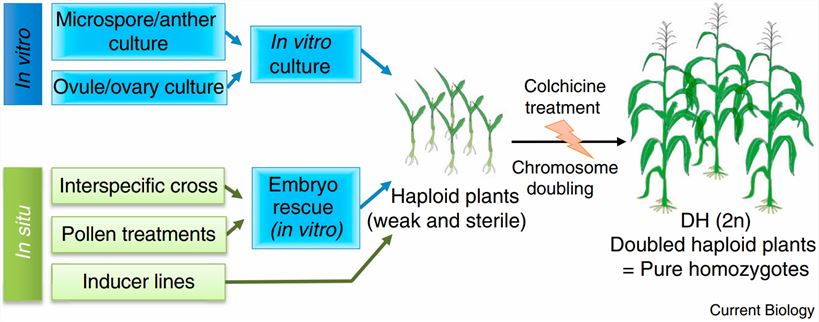As a leading plant biotechnology company featured in plant tissue culture and plant breeding, Lifeasible offers service for the haploidization of plants.
Haploid plants refer to the plants that have a single set of chromosomes. Haploids are largely essential for plant breeding, as they allow quick production of homozygous diploid or polyploid plants. Moreover, as they possess only one set of chromosomes, mutations and recessive characteristics can be phenotypically expressed. Therefore, haploid plants play very important roles in both plant breeding and functional studies of plant genes.
Haploid plants can be produced by multiple approaches, such as delayed pollination, pollen irradiation, thermal shocks, colchicine treatment, plant tissue culture, distant hybridization, and so on. However, currently, two of the most commonly used methods are anther culture and interspecific hybridization followed by chromosome elimination.
 Figure 1. Overview of doubled haploid technology (Gilles, L.M., et al. 2017)
Figure 1. Overview of doubled haploid technology (Gilles, L.M., et al. 2017)
With an excellent group of professionals, large-capacity plant breeding base, and years of experience in plant biotechnology, Lifeasible has developed a comprehensive platform for haploid plant breeding. We provide one-stop services for haploidization of a wide range of plant species, including tobacco, datura, potato, rape seed, cereals, and grasses.
Anther culture is an in vitro culture technique by which developing anthers are cultured into haploid plants. Specifically, anthers of a specific developmental stage are excised aseptically from unopened flower buds, and are cultured on the nutrient medium. Then the microspores within the cultured anther will develop into callus tissue or embryoids that give rise to haploid plantlets either through organogenesis or embryogenesis. Our customized anther culture protocols ensure optimal physiological status of the donor plants, efficient pre-treatment of the donor material, ideal developmental stage of the microspore, as well as excellent culture conditions.
The method of interspecific hybridization followed by chromosome elimination relies on the mechanism that when crossing two species with very different genome backgrounds, uniparental chromosome will be eliminated during early development stages of a hybrid embryo, which eventually lead to the formation of haploid embryo. We offer our customers cutting-edge chromosome elimination service and chromosome number validation via flow cytometry or fluorescent in situ hybridization (FISH) assays.
We also provide services such as microspore culture, ovule/ovary culture, irradiated pollen-induced in situ parthenogenesis, CENH3-mediated haploid induction, and identification of haploids and double haploids.
01
Years of experience in plant breeding
02
Diverse haploidization strategies
03
Customizable one-stop service platform
04
Shorten the plant breeding process
Lifeasible provides customers with comprehensive plant breeding solutions, and also provides plant analysis, plant tissue culture and plant genetic engineering services to help customers conduct in-depth research.
References
Lifeasible has established a one-stop service platform for plants. In addition to obtaining customized solutions for plant genetic engineering, customers can also conduct follow-up analysis and research on plants through our analysis platform. The analytical services we provide include but are not limited to the following:
STU-CRISPR System Improves Plant Genome Editing Efficiency
April 19, 2024
Application of Exosomes in Facial Beauty
April 12, 2024